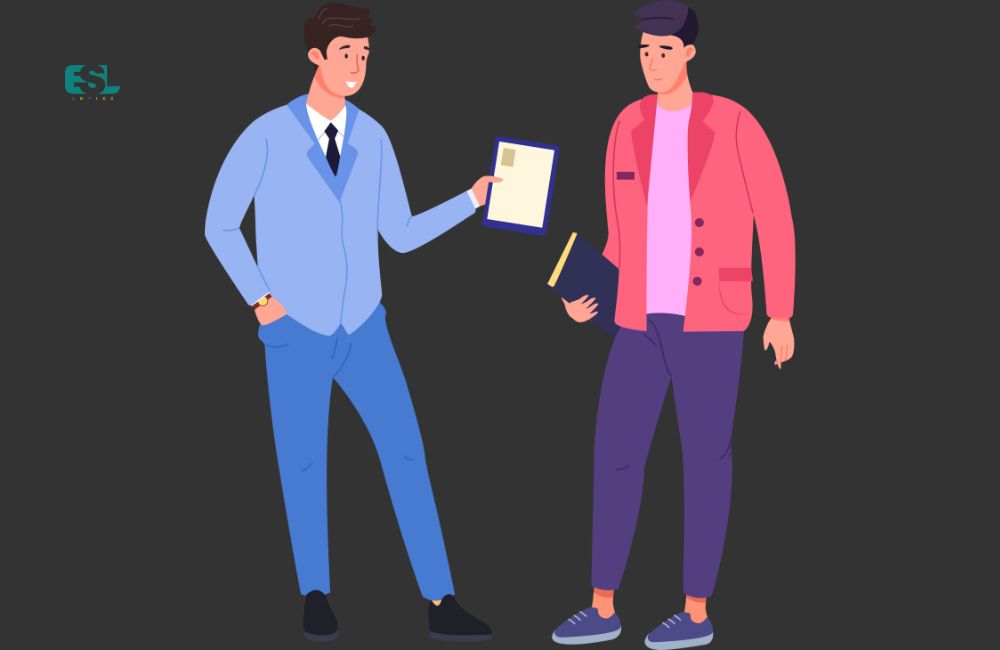The importance of studying from notes cannot be overstated. Notes help us understand complex topics, prepare for exams, and keep up with the curriculum. However, sometimes, we miss lectures due to unforeseen circumstances or need extra help understanding certain concepts. In such cases, asking for notes from friends can be extremely helpful. Here is a guide on effectively asking for notes in English from friends.
To politely ask for notes in English from friends, use phrases like “Could you share your notes…?” specify the lecture or topic, and thank them for their help. Offering to help in return encourages a cooperative learning environment.
Are you looking for a book or a guide to help you learn and improve your English? You may try English Made Easy Volume One: A New ESL Approach: Learning English Through Pictures (Amazon Link). This book creatively uses pictures and text in tandem to revolutionize English language learning, making it easier to understand and more effective overall.
For more detailed information on how to request notes respectfully and effectively, continue reading. I’ll delve deeper into the nuances of politeness, specificity, reciprocity, and the importance of expressing gratitude when requesting notes. These strategies not only aid in acquiring the needed academic resources and foster a healthy and mutually supportive academic environment.
Table of Contents
- Importance of Being Polite When Asking for Notes
- The Importance of Expressing Gratitude
- The Benefit of Being Specific When Requesting Notes
- Fostering Reciprocity While Requesting Notes
- Sample Conversation: Asking for Notes in English from Friends
- Final Thoughts
- 10 Frequently Asked Questions Related to Asking for Notes in English from Friends
Importance of Being Polite When Asking for Notes
Getting notes from friends can be a lifesaver, especially if you’ve missed a class or found it difficult to understand a concept. However, it’s vital to remember that you’re requesting a favor when you’re asking for someone else’s notes. It’s essential to approach this request with politeness and respect.
This way, you can ensure that your friends feel appreciated and are more likely to help you out in the future. This section explores the significance of politeness in such scenarios. It provides you with handy tips and phrases that can assist you in asking for notes respectfully and respectfully.
When asking for notes, how you phrase your request is crucial in how it’s received. It’s not just about what you’re asking; it’s also about how you’re asking. By using polite phrases, you recognize the effort and time your friend has put into making the notes. Here are various ways to frame your request:
- Could I possibly have a look at your notes?
- I missed the class, would you mind sharing your notes?
- If it’s not too much trouble, could I borrow your notes?
- I seem to have misunderstood some parts, can I check your notes?
- It would be great if you could share your notes with me.
- Would you be willing to share your notes?
- Could you help me out by sharing your notes?
- If it’s not a bother, could I have a look at your notes?
- Could I trouble you for your notes?
- I’d appreciate if you could share your notes.
- If it’s convenient for you, could I go through your notes?
- I’d be grateful if you could let me borrow your notes.
- If you don’t mind, could I have a look at your notes?
- Would it be possible for you to share your notes?
- I could use some help with the class notes, could you lend me yours?
- If it’s alright with you, I’d like to check your notes.
- Can you assist me by sharing your notes?
- Could I please refer to your notes?
The Importance of Expressing Gratitude
After your friend has agreed to share their notes, expressing your thanks is essential. Doing so not only shows your appreciation but also reinforces the positive aspects of your relationship. It’s a simple and effective way to strengthen your friendship and encourages a helpful and supportive environment. Here are various ways to express your gratitude:
- Thanks for sharing your notes.
- I appreciate you lending me your notes.
- Thanks a lot for your help.
- Your assistance has been invaluable.
- Thank you for saving the day with your notes.
- Your generosity is much appreciated.
- I am grateful for your kindness.
- Thanks for going out of your way to help me.
- Your notes were a great help, thanks.
- I’m indebted to your help.
- I couldn’t have done it without your notes, thanks.
- Your help made a huge difference, thank you.
- Thanks for being such a lifesaver.
- I appreciate your willingness to share your notes.
- Your support has been a big help.
- I can’t thank you enough for your help.
- I’m grateful for your assistance, thank you.
- Your notes have been really helpful, thanks for sharing.
The Benefit of Being Specific When Requesting Notes
When asking for notes from friends, being vague can lead to confusion and may result in you not receiving the correct information you need. That’s why being specific in your request can be beneficial. This doesn’t mean you must micromanage how your friend provides the notes. Instead, it’s about giving enough information to ensure you receive exactly what you need. This section will discuss the importance of mentioning the subject or topic and specifying your preferred format for the notes.
The Importance of Mentioning the Subject or Topic
A crucial detail to provide when asking for notes is the specific subject or topic you need. Mention the lecture’s subject, topic, or date to give your friend a clear understanding of what you’re looking for. This will make it easier for them to locate the correct notes and shows that you value their time. Here are some examples of how you might request notes:
- Can I get your notes from last week’s biology lecture?
- Would you mind sharing your notes on the civil rights movement from history class?
- I need the notes from yesterday’s physics class on quantum mechanics. Could you share them with me?
- Could I borrow your notes from last month’s literature lecture on Romantic poetry?
- I missed the class on trigonometry in math. Could you help me with the notes?
- Would it be possible for you to share your notes from the chemistry class about organic compounds?
- Could you assist me with the notes from our last political science class on international relations?
- I could use some help with the English lecture notes on Shakespeare’s tragedies.
- Could you share the economics class notes about supply and demand?
- Can you help me with the notes from our sociology class on social stratification?
- I would appreciate if you could share your notes on differential equations from the math class.
- Could I refer to your notes from the anatomy lecture in biology class?
- Can you assist me with the notes on Renaissance art from the history lecture?
- Could you lend me your notes from the psychology class about cognitive development?
- I would be grateful if you could share your notes on environmental science about climate change.
- Would it be possible for you to share your notes from the computer science class on coding algorithms?
- Can I check your notes from the philosophy class about existentialism?
- Could you help me with the notes from the physics lecture on relativity theory?
Specifying the Preferred Format of Notes
Everyone has a different style when it comes to taking notes. Some prefer writing everything by hand, while others might write their notes digitally. When asking for notes, it would benefit both parties if you specify the preferred format. Here are several ways you can request notes in a specific format:
- Could I have a scanned copy of your history notes on the French Revolution?
- Would it be possible for you to email me the Word document of your physics notes on magnetism?
- Can you send me a picture of your handwritten notes on the periodic table from chemistry class?
- Could I have the Google Docs link to your notes on British literature?
- Would you mind sending me a PDF of your biology notes on plant cells?
- Could you share the PowerPoint presentation from our business class on market segmentation?
- Can you send me a photo of your notes on ancient civilizations from history class?
- Would it be possible for you to share the OneNote page with your notes on calculus?
- Can I have the Word file of your English notes on metaphors and similes?
- Could you share your notes on environmental science in a PDF format?
- Can you send me a snapshot of your notes on statistics from math class?
- Would it be possible for you to email me your sociology notes on social norms in a Google Docs file?
- Could I have a copy of your digital notes on computer programming languages?
- Can you share the scanned copy of your notes on human anatomy from our biology class?
- Would you mind sending me a photo of your philosophy notes on ethics?
- Could I get the Google Docs link to your political science notes on constitutional law?
- Can you send me the PDF file of your notes on economic principles?
- Would you mind sharing the OneNote page with your literature notes on Victorian novels?
Fostering Reciprocity While Requesting Notes
Requesting notes from friends is not a one-sided transaction. Instead, it should be an opportunity to foster reciprocity and deepen mutual support within your friendship. While your friend helps you out by sharing their notes, there are ways you can also contribute.
This can be in the form of sharing your notes in return, offering to help them understand a challenging topic, or following up on their contribution. This section will delve into the importance of offering your help in return and the significance of following up after your friend has shared their notes.
The Significance of Offering Help in Return
Offering your help in return can make your note-requesting process more appealing to your friend. It is an opportunity to exchange knowledge and skills, fostering a sense of mutual support and camaraderie. Below are examples of how you can frame your request while offering your assistance:
- I could use your calculus notes. Let me know if you need any help with English.
- Could you share your notes on classical literature? I’m good at physics if you need assistance there.
- Would you mind sharing your chemistry notes? I can help with computer programming in return.
- Can I borrow your notes on philosophy? I could share my biology notes in return.
- Could you assist me with your Spanish lecture notes? I can help you with French.
- I would appreciate your geography notes. I can offer my math notes in return.
- Can I check your notes on astronomy? I can share my notes on geology with you.
- Could you lend me your psychology notes? I could assist with economics if needed.
- Would you mind sharing your notes on music theory? I can help you with your art history studies.
- Can you share your political science notes? I can offer my anthropology notes in return.
- Could I refer to your notes on ancient history? I’m good at modern history if you need assistance.
- Would it be possible for you to share your notes on molecular biology? I can help you with genetics.
- Can I check your notes on poetry? I could share my notes on prose literature with you.
- Could you lend me your notes on quantum mechanics? I can assist with classical physics if needed.
- Would you mind sharing your notes on architectural history? I can help you with design principles.
- Can you share your calculus notes? I can offer my statistics notes in return.
- Could I refer to your notes on sociology? I’m good at cultural studies if you need assistance.
- Would it be possible for you to share your notes on data structures? I can help you with algorithms.
The Importance of Following Up
The process doesn’t end once you’ve received the notes. Following up is crucial. This could be by expressing your gratitude, providing the help you offered, or just a casual check-in to see if they need assistance with anything else. Here are some ways you can follow up:
- Thank you for sharing your chemistry notes. They were really helpful!
- Your history notes were great. Let me know if you need help with math.
- I appreciate your English literature notes. They made a big difference.
- Your biology notes were spot on. Don’t hesitate to reach out if you need assistance with physics.
- Thanks for the geography notes. They were quite useful for the test.
- Your psychology notes really helped me understand the concepts better.
- I found your physics notes incredibly useful. Let me know if you need help with chemistry.
- Your Spanish notes were easy to understand. If you need any help with French, just let me know.
- Thanks for sharing your calculus notes. They made the subject much clearer.
- Your anthropology notes really helped me understand the topic.
- Your computer science notes were comprehensive. Let me know if you need help with coding algorithms.
- I appreciate your philosophy notes. They were really insightful.
- Your sociology notes were quite useful. Let me know if you need help with psychology.
- Thanks for the music theory notes. They were quite informative.
- Your art history notes really made a difference in my understanding of the subject.
- I found your astronomy notes incredibly useful. Let me know if you need help with geology.
- Your quantum physics notes were comprehensive. Let me know if you need help with classical physics.
- I appreciate your English literature notes. They were really helpful.
Sample Conversation: Asking for Notes in English from Friends
Situation: Alex missed a week of classes due to illness. He approaches his friend, Jamie, to ask for notes.
Alex: Hey Jamie, hope you’re doing well. I missed out on a lot last week because of my flu. Do you think I could borrow your notes to catch up?
Jamie: Oh, hey Alex! Sorry to hear you were sick. Of course, I’ve got notes from all the lectures. Would you like them in digital format or paper?
Alex: Digital would be great if it’s not too much trouble. I can copy them over the weekend.
Jamie: No worries at all! I’ll email them to you tonight. Just let me know if you have any questions or need further clarification on any topic.
Alex: Thanks so much, Jamie. I really appreciate it. I’ll make sure to return the favor if you ever need it.
Final Thoughts
Requesting notes from friends is not merely about getting the information you missed; it’s an opportunity to foster a sense of cooperation and mutual support. When appropriately done, it promotes a healthy academic environment where friends help each other in their quest for knowledge.
Remember to be polite and respectful in your request, be clear about what you need, express gratitude, and show your willingness to help in return. Following up after receiving the notes shows your friend that you value their help. With these steps, you can effectively ask for notes from your friends, nurturing your friendships and your academic growth simultaneously.
10 Frequently Asked Questions Related to Asking for Notes in English from Friends
1. Is it okay to ask multiple friends for their notes?
Yes, as long as you’re respectful and not overwhelming anyone. Different perspectives can be helpful.
2. How can I ensure I’m not imposing when asking for notes?
Always be polite, explain your situation briefly, and make sure they’re comfortable sharing.
3. What if my friend refuses to share their notes?
It’s essential to respect their decision and try asking someone else or referring to textbooks and online resources.
4. Can I offer something in return when asking for notes?
It’s a kind gesture to offer help in another subject or treat them to a coffee or snack as a thank-you.
5. Is it okay to directly photocopy or scan someone’s notes?
Always ask for permission first, as some people might want their notes back quickly or have personal annotations.
6. How do I ask for notes from someone I’m not very close to?
Approach them politely, introduce yourself, explain your situation, and express gratitude, whether they agree or not.
7. Should I return the notes once I’m done?
Yes, unless they’ve given you a copy or said you could keep them.
8. Can I share the notes I borrowed with others?
Always ask the original note-taker for permission before sharing their work with others.
9. How can I ensure I understand the notes I’ve borrowed?
You can arrange a study session with the friend who gave you the notes or ask them questions if you have any doubts.
10. What’s a polite way to remind someone if they forgot to send me the notes?
You can say, “Hey [Name], I hope you’re doing well. Just checking in about the notes. Whenever you get a chance, could you please send them over? Thanks!”






